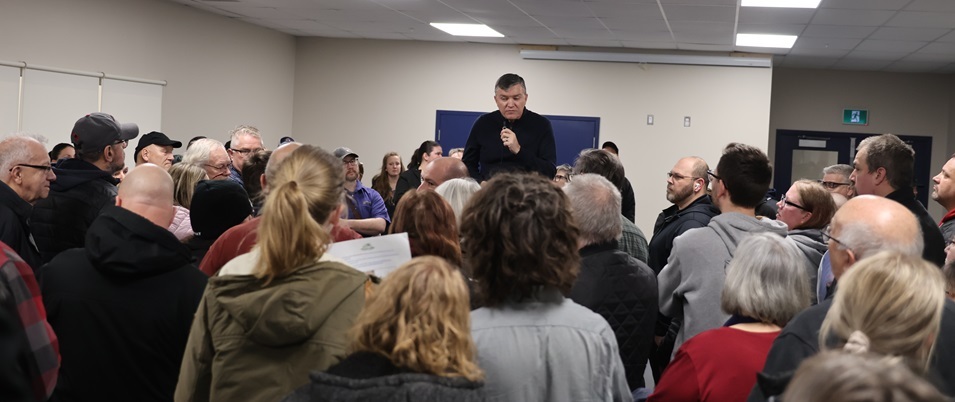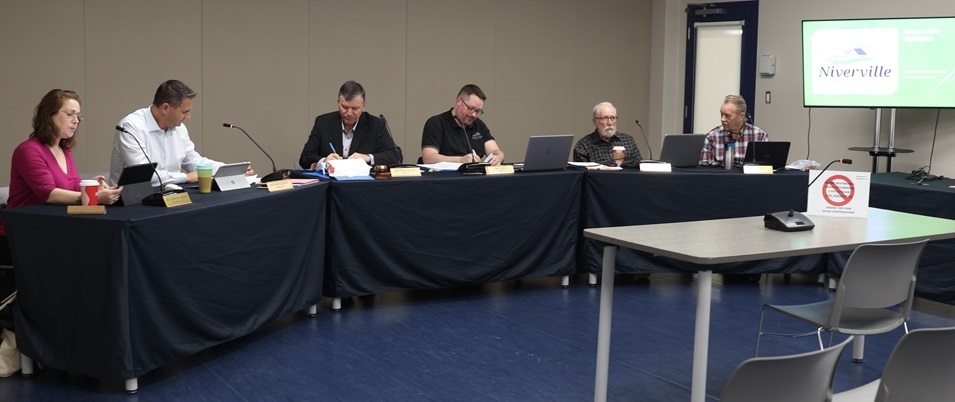
Approximately 300 Niverville residents turned out for an open house held by town council at the CRRC on March 1. According to Mayor Myron Dyck, it’s by far the largest turnout he’s seen for any municipal open house in his 20 years on council.
The open house was geared towards residents living in the older segments of Niverville whose households still derive water from private well sources. The goal of the event was to gauge interest of approximately 700 homeowners to switch over to the municipal water system.
The large showing of residents was, at least in part, symbolic of the passion felt by so many who are happy with their well system and worry about the high costs involved in municipal hookup.
Unfortunately for many of the attendees, the open house fell short of their expectations. The vast majority were already onsite when the doors swung open at 6:00 p.m. They soon filled the meeting room to capacity and snaked far into the corridor.
Attendees were greeted by information storyboards with a collection of council members and town staff there to answer their individual questions. The small pile of print materials and surveys available for pickup were gone within minutes.
In the end, it was exactly what town administration had advertised that it would be: an informal open house. But this crowd was hungering for answers and assurances.
Brian and Linda Richard, residents of Edelweiss Crescent, were among the disappointed. Within minutes of pushing their way through the crowded meeting room, they left feeling disillusioned and frustrated.
“We thought we’d be able to sit down, they’d talk to us, and we could ask questions,” Linda told The Citizen. “But this was a waste of our time.”
She said council members and staff inside were kept very busy talking to individuals, leaving little time to cover the many questions held by the masses.
The Richards aren’t opposed to municipal water hookup, especially if government grants can be obtained to subsidize the cost. The question at the top of their mind, though, wasn’t answered on Friday night.
It’s a concern held by others, too. Will they be allowed to install a water service line to their home but keep it inactive until their well breaks down?
Just two years ago, the Richards invested money in repairs to their well. Five years ago, they installed an expensive reverse osmosis water filtration system.
“I had my water tested by Culligan and my water is better than the bottled water they sell in the stores,” Brian said.
Mayor Dyck says the public’s misunderstanding about the nature of the event is unfortunate.
“I believe that there was a central thought that somehow instead of the open house being about providing information, that hooking up to town water was [already] predetermined by council and was going to be forced on each property owner,” Dyck says. “As a result, some came prepared to let their wishes be known.”
Instead, he adds, the purpose of the open house was primarily to offer residents with the basic information on what municipal water hookup could mean to them and then to encourage them to complete and return a survey to help council gauge buy-in over the following weeks.
“If there is a group in a certain part of town that wants it, then council will pursue that project,” Dyck says. “If there is not a lot of buy-in, then council will not move ahead.”
To quantify what mass buy-in means, Dyck adds that it would have to be 80 percent or higher.
Recognizing quickly what people had come for, Dyck made a quick pivot at the meeting by attempting to address questions from atop a stool. Had they been prepared with what to expect, he says, a larger room and sound system would have been booked.
What Would Municipal Water Hookup Entail?
If things go as planned, council hopes to acquire a government grant with the potential to cover up to 50 percent of the cost of installing water main lines throughout the older sections of Niverville.
Even so, council isn’t shy to admit that a project of this scale would take years to complete, be highly invasive, and be an expensive endeavour for affected homeowners.
This, Dyck says, is precisely why council will not proceed without clear majority buy-in.
Affected homeowners would be looking at two primary costs: that of the main line running past their home and that of the service line which connects their home to the main.
The initial main line cost would be calculated based on the frontage of their property and be charged at $101.23 per foot of frontage. Using the example of an average sized lot with a 77-foot frontage, this comes to a total cost of almost $7,795. This does not yet include installation and contractor costs. Nor does it take into consideration a 50 percent government subsidy.
Each homeowner would have the opportunity to pay this fee outright and incur no interest or take advantage of a 10-year municipal finance option where it would be added to their annual property taxes, with interest.
Over ten years, homeowners with average-sized lots could expect an approximate $650 added annually to their tax bill.
Next is the water service line installation and connection. Here, homeowners would have the option of paying for this hookup immediately or waiting until it is more financially feasible for them to consider.
On the average-sized lot, council estimates an approximate $16,000 fee, although it will be based on the distance from the water main to the home’s water hookup area. Considering that water mains will run along only one side of the street, homes on the opposite side of the main will have a greater distance to cover financially.
There is no ten-year finance option currently being offered by council for the cost of the service line. As well, all the previously mentioned costs are dependent on factors such as interest rates of the day and available grant monies.
If the idea of water main installation isn’t broadly accepted, council is still open to pursuing grants for main line installation in blocks of town or along streets where homeowners agree to proceed.
In order to determine buy-in, petition signatures must be collected showing that 80 percent of homeowners in the area are in favour of hookup.
As for homeowners who already have a main line running immediately past their home, hookup to that main line is no longer an option once their well breaks down and is beyond repair.
But as council policy currently stands, anyone with a main line running near their property but not immediately past it will still have the option to dig a new well if they choose to do so.
The Pros and Cons of Municipal Water
One of the most compelling arguments in favour of having a water main line near your home is the automatic installation of fire hydrants along those mains. For many homeowners, this means an immediate reduction on their homeowner’s insurance, which could result in hundreds of dollars in annual savings.
To the community as a whole, it means redirecting taxes to other important areas instead of investing them in expensive water tanker trucks needed by the local fire department when hydrants don’t span the entire community.
Of course, water quality is said to improve when processed through a municipal treatment plant. As well, hard water minerals are removed, thus eliminating the need for water softeners and salt and, hopefully, extending the life of many household appliances.
According to the Culligan Water website, privately owned wells aren’t regulated like municipal water systems. This makes homeowners solely responsible to ensure their drinking water is safe from a broad range of contaminants such as lead, copper, and bacteria.
In communities where private wells exist, boil water advisories can often occur when lines or wells are compromised or repaired.
The cons of adding municipal water are fewer and can be summed up primarily through the costs incurred for initial hookup and ongoing quarterly water fees. Even so, for many homeowners, this may be the very thing that prohibits their ability to simply sign on the dotted line.
Comments from Water Treatment Plant Operator
Andrew Rempel is one of the operators responsible for keeping things running smoothly and efficiently at the local water treatment plant.
In response to a thread on social media regarding Friday’s meeting, Rempel shared his disappointment in the level of negativity directed at town staff and council regarding this initiative.
“Unfortunately, there is so much misinformation going around on all of these water [related] threads,” Rempel said. “Most of this negativity comes my way. In my opinion, I would push [council] for an additional sit-down Q-and-A meeting where all questions could hopefully be answered.”
Some of that misinformation, he says, is in regard to a third well that council has commissioned as a backup to the initial two wells located near New Bothwell. Rumours have been floating about that council commissioned the well in anticipation of needing greater supply when more of Niverville hooks up to municipal water.
“This third well is being drilled to add redundancy to the well system,” Rempel adds. “Currently with the two wells we can easily keep up with production and have the ability to produce up to 80 litres/second of raw water. If one of those two wells needs repairs or needs to be taken offline, the capacity is reduced down to 40 to 45 litre/second.”
The Survey
For those not fortunate enough to get their hands on a paper survey at Friday’s event, an online survey is available on the town’s website. As well, paper copies can be picked up at the office during open hours.
Cyrus Reimer is the director of communications and public relations for the town of Niverville. He says that he can’t stress to residents enough the importance of filling out and returning a survey.
“That way we can take all of the information, compile it all, and we can get a proper understanding of exactly what the people think,” Reimer said. “We always welcome comments to feedback@whereyoubelong.ca. But if people call or send emails, it’s very hard to aggregate it. That’s why we’re really pushing people to complete the survey.”



















